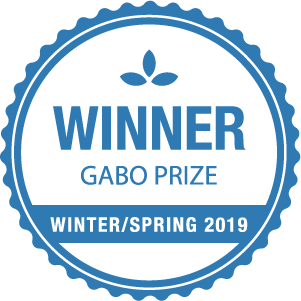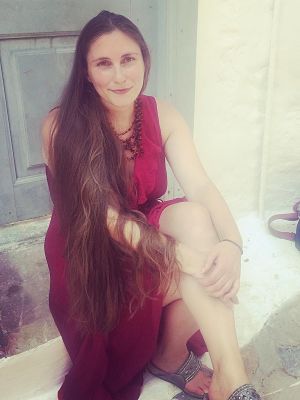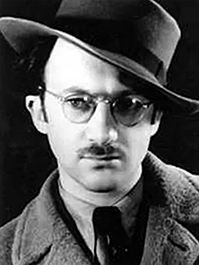Excerpts from Poems from My Diary
The Clay of Time has Grown Soft
The clay of time has grown soft. The kneading of sunset
after sunset has made it rise. A tiny grain of sand
has suddenly split open in a dream to dispel a mystery,
and only the owl weeps from a silver lock of tangled hair.
The dead have been upright now for quite some time!
They hastily escaped here from the other world, from their heavy load,
and are doing yoga, playing chess and are free and intellectual,
laying siege to the opera and pecking out its box office.
Does anyone still remember who tore their limbs apart?
With weak and unsound teeth one should chew with extra care.
These dead love abstract art and being at loggerheads,
instead of the mark of Cain, Cain wears a mark of Abel.
And only a blind seer, flayed down to the bone,
a prototypical prophet who has never died
and no one knows he rolls away the darkness, could he be the sun?—
He runs from abyss to abyss rescuing the smiles of the sacrificed.
Those Green Eyes From Long-Long-Long Ago…
Those green eyes from long-long-long ago are gone. That fir-tree
forest green. Still, as I do just barely see the eyes, it’s a sign:
They see me. And fir-branch-green is also my envy
of starved ghosts, of sounds and of voices.
If God would only recreate their green, that dark green,
He would truly be God. How could they vanish?
I’m wandering in a forest: the sun burns through a cobweb,
green tears rush from green caves among roots.
If that green set of eyes would shut for all time,
worm-eaten seconds would take the place of eternity.
I wander in a forest: it is night. A root pulses, still believing,
after all, the sun through the cobweb here has not gone away.
They see me, that dark green, they wait for a sign,
they shiver side by side with their face opposite mine.
And from the green caves, rushing tears swim
into my visions and leave me their shine.
In Memory of Uri Tsvi Greenberg
When all had scattered from the Mount of Olives
and only one remained within the broken stone,
each had gone toward home, as always, alone,
and he, from the burned-out cliff, accompanied them in silence.
And just then a white flame of soul from his deceased breath
reduced the wreath that he had hated during life to ash.
For if he had been covered in scorpion-like thorns—
his deceased fingers would have drawn them to his skull.
And two thin, small voices, and in both exalted tears
came near, settling in like a candle in sand
at grave’s head: his mother’s mournful tears,
and the blooming tears from the trees in his garden.
And just then Jerusalem also approached, in a sunset
that never fully sets, never sets over times and eras—
and she, in the armor of her never-setting twilight,
kissed her pious poet through the face of rock.
A Face in the Window
A face in the window. It’s my neighbor with the blue glasses,
resembling flashes of blue lighting in rain: “Take pity
and come quickly to my doorstep, you will hear a mystery
of weeping and perhaps be able to explain it for me.”
We come to his doorstep. My neighbor in the blue glasses
rises on his toes to reach the mezuzah and bring it to his ear,
as if it were the fiddler in a seashell: “Is it my creator
weeping there, my child, or my wife, who was burned to ashes?
The door is open. Yortsayt candles with red peyes are burning.
I become a brother to my neighbor’s fate, and my ear
detects more clearly, like him, the weeping from his mezuzah:
Weeping from his wife of ashes, his child, or his creator?
The yortsayt candles with red peyes are drowning in the room.
The door slams behind us. Outside plays the fiddler.
“I will tell you the truth, as good neighbors do:
The weeping comes from all three separately, all three of them together.”
Our Terror Is the Terror of Ponar and Majdanek
Our terror is the terror of Ponar and Majdanek,
Their grass and chamomile—our bread until death.
Our hands will feel shame, though we’ll raise a glass:
To whom? To our savior? To the bliss of a glance?
Our breath belongs to a different kind of society:
To a mother, a grandfather, a snow-buried baby.
We’ll mine the earth the sun has snuffed out, to dig down
all the way to our language of hearth and hometown.
With a flash of iron lightning—with a pen instead of a shovel.
Twenty-two the number of strings on the fiddle.
Our blood will still feed string after string,
we’ll play them with a faith that’s complete.
We’ll play them like so, until the remembrance
splits open within us: for a world full of people.
It Drew Us Both Here….
It drew us both here, both the seashell and me,
to bring us together on the seashore in Yaffo,
so that within the seashell that being could send me
a greeting from its creator in the grottos.
The shell around the small pink body is still tender in immaturity,
and warm: a shell-child born in a woman’s head covering.
Still reflecting the caress of its distant arm
and the anguished parting with faultless form.
If I could be the smith of such a seashell,
with the phantom weeping sea and struck up bit of feeling,
with its armor speckled with tiny rainbow rings
and within the rain also rushing, a half shell or a whole:
I would tear myself away from syllables and thoughts—
the ribs of the soul—and like nothing in my nature,
lift the sea onto my shoulders in thanks
and gleam like its gull.
![]()
די ליים פון צײַט איז ווייך געוואָרן. ס’גייט שוין אויף די קנעטעניש
פון זונפאַרגאַנג נאָך זונפאַרגאַנג. עס ווערט שוין באַלד געשפּאָלטן
אַ זעמדעלע אין חלום צו צעטרייבערן אַ רעטעניש,
און בלויז די סאָווע פּלאַנכעט פון א זילבערלעכן קאָלטן.
די מתים זענען לאַנג שוין אויפגעשטאַנען! זענען האַסטיק
אַנטרונען דאָ פון יענער–וועלט, פון הויקערדיקער משׂא
און מאַכן יאָגאַ, שפּילן שאַך און זענען פרײַ און גאַסטיק,
באַלעגערן די אָפּערע און פּיקן אויס איר קאַסע.
געדענקט נאָך עמעץ ווער עס האָט צעריסן זײַנע גלידער?
צו וואַקלדיק און שוואַך די ציין מע זאָל אַזוינס צעקײַען.
די מתים האָבן ליב אַבסטראַקטע קונסט און קידער–ווידער,
אַנשטאָט אַ קַין–צייכן טראָגט אַ הבל–צייכן קַין.
און בלויז אַ בלינדער זעער ביזן אָפגרונט אַ צעשונדענער,
אַ קדמונדיקער נביא וואָס איז קיין מאָל ניט געשטאָרבן
און קיינער ווייס ניט: קײַקלט ער דעם חושך, איז די זון דען ער? —
לויפט אויסלייזן פון תּהום צו תּהום די שמייכלען פונעם קרבן.
ניטאָ די גרינע אויגנפּאָר פון לאַנג–לאַנג–לאַנג. די גרינע
ווי יאָדלעוואַלד. נאָר קוים איך זע די אויגן, איז אַ סימן:
זיי זעענ מיך. און יאָדלע–צווײַגן–גרין איז אויך מײַן קינאה
צו גײַסטער אויסגעהונגערטע, צו קלאַנגען און צו שטימען.
ווען גאָט וואָלט בלויז באַשאַף זייער גרין דאָס טונקל–גרינע,
ער וואָלט געווען דער זעלבער גאָט. ווי קאָנען זיי ניט–ווערן?
איך בלאָנדזשע אין אַ וואַלד: עס ברענט די זון אין פּאָוועטינע,
פון גרינע היילן שורשען צווישן וואָרצלען גרינע טרערן.
ווען די אָ גרינע אויגנפּאָר וואָלט אונטערגיין אויף אייביק,
אַנשטאָט אַן אייביק וואָלטן זײַן צעווערעמטע סעקונדן.
איך בלאָנדזשע אין א וואַלד: ס’איז נאַכט. אַ וואָרצל שלאָגט נאָך גלייביק,
די זון אין פּאַוועטינע איז נאָך אַלץ דאָ ניט פאַרשוווּנדן.
זיי זעען מיך, די טונקל–גרינע, וואַרטן אויף אַ סימן,
זיי ציטערן בײַנאַנד מיט זייער פּנים וויזאַווי מיר.
און שורשענדיקע טרערן פון די גרינע היילן שווימען
אַרײַן אין מײַנע זעונגען און לאָזן זייער גלי מיר.
לזכר אורי–צבי גרינבערג
ווען אַלע זענען זיך צעגאַנגען פונעם הר–הזיתים
און איינער איז אין אויסגעהאַקטן פעלדז פאַרבליבן,
אַוועק איז איטלעכער אַהיים אַלייניקער ווי תּמיד
און ער, פון אויסגעברענטן פעלדז, באַגלייט האָט זיי אַ שטומער.
און יעמאָלט האָט אַ ווײַסער ליכטזײַל פון זײַן טויטן אָטעם
געמאַכט צו אַש די קרענץ וואָס ער האָט פײַנט געהאַט בײַם לעבן.
אַז אויבן וואָלטן אים באַדעקט סקאָרפּיאָנענדיקע דערנער —
די טויטע פינגער וואָלטן זיי אַ צי געטאָן צום שאַרבן.
און צוויי קול–דממה–דקהס און אין ביידע הויכע טרערן
דערנענטערט האָבן זיך צו אים, געשטעלט זיך בײַם צוקאָפּן,
ווי ליכט אין זאַמד: לוויהדיקע טרערן פון זײַן מאַמע
און בליִענדיקע טרערן פון די ביימער אין זײַן גאָרטן.
און יעמאָלט האָט זיך אויך צום פעלדז דערנענטערט אין אַ שקיעה,
וואָס גייט ניט אונטער, גייט ניט אונטער איבער צײַט און צײַטן —
ירושלים, און זי האָט אין פּאַנצערדיקער שקיעה,
וואָס גייט ניט אונטער, דורכן פעלדז אַ קוש געטאָן איר פײַטן.
אַ קאָפּ אין פענצטער
אַ קאָפּ אין פענצטער. ס’איז מײַן שכן אין די בלויע ברילן
געגליכן צו אַ רעגן מיט אַ בלויע בליץ אין איינעם:
‘’דערבאַרעם זיך און קום געשווינדער צו מײַן שוועל, וועסט הערן
אַ רעטעניש–געוויין און אפשר קאָנען עס באַשיידן.”
מיר קומען צו זײַן שוועל. מײַן שכן אין די בלויע ברילן
דערלאַנגט זיך אויף די פיספינגער אַ הייּב צו דער מזוזה
און שעפּט זי אָן אין אויער, ווי דעם פידלער אין אַ מושל:
‘’צי וויינט עס מײַן פאַרברענטע פרוי, מײַן קינד, צי מײַן באַשעפער?”
די טיר איז אָפן. ס’ברענען יאָרצײַטליכט מיט רויטע פּיאות.
איך ווער אַ גורל–ברודער צו מײַן שכן, און מײַן אויער
שעפּט אָן העלהערעריש, ווי ער, ס’געוויין פון זײַן מזוזה:
געוויין פון זײַן פאַרברענטער פרוי, זײַן קינד, צי זײַן באַשעפער?
די יאָרצײַטליכט מיט רויטע פּיאות טרינקען זיך אין קאַמער.
ס’פאַרהאקט זיך הינטער אונדז די טיר. דער פידלער איז אין דרויסן.
‘’איך וועל דיר זאָגן אמתדיק, ווי צווישן גוטע שכנים:
דאָס וויינען אַלע דרײַ באַזונדער, אַלע דרײַ אין איינעם.”
אונדזער שרעק איז די שרעק פון פּאָנאַר און מײַדאַנעק
אונדזער שרעק איז די שרעק פון פּאָנאַר און מײַדאַנעק,
אונדזער ברויט ביזן טויט — זייער גראָז און רומיאַנעק.
מיר’ן הייבן אַ כּוס, נאָר די האַנט וועט זיך שעמען:
פאַרן גליק פון אַ בליק? פאַרן גואל? פאַר וועמען?
אונדזער אָטעם געהערט צו אַן אַנדער מין עדה:
צו אַ קינד אונטער שניי, צו אַ מאַמע, אַ זיידע.
מיר’ן גראָבן די ערד וואָס די זון האָט פאַרלאָשן
צו דערגראָבן זיך צום עיר–והיימישן לשון
מיט אַן אײַזערנעם בליץ — מיט אַ פּען אַנשטאָט רידל.
צוויי און צוואַנציק די צאָל פון די סטרונעס בײַם פידל.
אונדזער בלוט וועט נאָך אָנקאָרמען סטרונע נאָך סטרונע,
מיר’ן שפּילן אויף זיי מיט אַ פולער אמונה.
מיר’ן שפּילן אַזוי, ביז עס וועט זיך צעשפּאַלטן
דער זכּרון בײַ אונדז: פאַר אַ וועלט מיט געשטאַלטן…
געצויגן האָט אונדז ביידן דאָ
געצויגן האָט אונדז ביידן דאָ, סײַ מיר און סײַ דער מושל,
מיר זאָלן שליסן קאַנטשאַפט אויפן ים–ברעג אויפן יפוער,
אָז יענע זאָל פון וואַסערהיילן ברענגען מיר אין מושל
אַ גרוס פון איר באַשעפער.
נאָך קינדיש–ווייך דאָס פּאַנצערל אַרום דעם ראָזן לײַבל
און וואַרעמלעך: אַ מושלקינד געבוירן אין אַ הײַבל.
נאָך שפּיגלט זיך די צערטלעניש פון אָפּגעשיידטן אָרעם
און פּײַנלעכע געזעגעניש מיט שלמותדיקער פאָרעם.
ווען קאָנען וואָלט איך זײַן דער גאָלדשמיד פון אַזאַ אָ מושל,
מיט קיינעמסדיקן ים–געוויין און אויפגעשפּילטן חושל,
מיט רעגן–בויגן–רינגעלעך געשפּרענקלטע אין פּאַנצער
און וווּ עס רוישט אַ רעגן אויך, אַ האַלבער צי אַ גאַנער:
אַרויסגעריסן וואָלט איך זיך פון זילבן און געדאַנקען —
די ריפּן דער נשמהס; און ווי גאָרניט אין מײַן טבע,
אַ הייב געטאָן דעם ים אויף מײַנע אַקסלען אים צו דאַנקען
און בלאַנקען ווי זײַן מעווע.
Translator’s Note:
Though these six poems are all taken from the same collection—the expanded edition of Abraham Sutzkever’s Poems from My Diary, published in 1985—writing a forward for all of them as one is difficult, as I have something different to say about each. “The Clay of Time has Grown Soft” strikes me as a work of social criticism. I suspect it may have been influenced by the decline of the social movements of the 1960s, combined with the after-effects of the wars Sutzkever had survived as a European and an Israeli, particularly the then-recent Six Day War of 1967, and the Yom Kippur War of 1973.
Uri Tsvi Greenberg, whom Sutzkever eulogizes in one of these poems, was a towering figure in Yiddish and Hebrew poetry, but, also, in some ways, Sutzkever’s opposite, a reality far from evident in Sutzkever’s respectful poem. While Greenberg’s poetry is widely respected across spectrums, Greenberg took what many would characterize as extreme political positions. Greenberg’s views were influenced by his unlikely survival of the brutal 1918 pogroms in Lvov; by the 1929 pogroms in Hebron, which shaped his outlook on the Israeli-Arab conflict; and by the Holocaust, which he foresaw in his writing and in which he lost his entire family.
While both Greenberg and Sutzkever had initially written poetry in Yiddish and Hebrew, Sutzkever settled on Yiddish early, refusing to switch after he arrived in Tel Aviv in 1947. Yiddish was still his language of “hearth and hometown,” as he writes in “Our Terror is the Terror of Ponar and Majdanek,” and he wanted it to be part of Israel’s future. Greenberg, on the other hand, published his first books in both languages, but eventually abandoned Yiddish decisively, convinced that Hebrew embodied the only path forward for Jews. He felt the same about Israel, and viewed any Jewish desire to remain in Europe as dangerously misguided. Though Sutzkever believed in Zionism, he also continuously expressed longing for his European hometown, Vilna, and his elegy for Greenberg is followed in the Diary collection by poems in which that yearning is particularly acute.
Before the Holocaust, before his migration to Israel, and despite the heavily political atmosphere of his native Vilna, Sutzkever began his poetic career as a poet of nature and this preoccupation remained with him throughout his life. In his work, nature embodies a creative force in and of itself, as evidenced in “Those Green-Green Eyes” and “It Drew Us Both Here.” The first of these two poems recalls the forests of Eastern Europe, while the second takes place in what may have been Sutzkever’s favorite part of Tel Aviv: Yaffo, known more commonly in Arabic as Jaffa. He often wrote in a café there by the sea.
Lastly, a “Face in the Window,” features a character who has appeared, with some variation, in Sutzkever’s short fiction as well as his poetry. The ideal of neighborliness is one that Sutzkever often returned to, no doubt influenced by having survived a tragedy in which neighbors turned on one another—a fellow survivor of the Vilna Ghetto once described hearing the anthem of the Nazi party being sung by the Lithuanians who lived next door.
![]()
Special Guest Judge, Piotr Florczyk:
I was immediately struck by the visionary undertow of these poems, their author wearing a mask of “a blind seer” and running “from abyss to abyss rescuing the smiles of the sacrificed.” While translators are rarely afforded heavenly powers, technically speaking, their work is no less salutary. “A root pulses,” the poet writes, “still believing, / after all, the sun through the cobweb here has not gone away,” and so do we, the readers, thanks to the translator Maia Evrona’s deft hand, as we discover with each new line a home for own hopes and fears. These timeless poems—“the ribs of the soul”—remind us of the need to praise our world in chorus with those who came before and those who are about to take our place.
—Piotr Florczyk is a poet, essayist, and translator of Polish poetry. His most recent books
are East & West, a volume of poems from Lost Horse Press, and two volumes of
translations published by Tavern Books, My People & Other Poems by Wojciech
Bonowicz and Building the Barricade by Anna Świrszczyńska, which won the 2017
Found in Translation Award and the 2017 Harold Morton Landon Translation Award.
Florczyk, a doctoral candidate at the University of Southern California, lives in Los
Angeles with his wife and daughter. For more info, please visit: www.piotrflorczyk.com


 Maia Evrona’s poems, as well as excerpts from her memoir on growing up with a chronic illness, have appeared in Prairie Schooner, Valparaiso Poetry Review, and elsewhere. Her translations of Abraham Sutzkever were awarded a 2016 Translation Fellowship from the NEA and have appeared in Poetry Magazine, The Kenyon Review online and other venues. She also loves to sing. Her website is
Maia Evrona’s poems, as well as excerpts from her memoir on growing up with a chronic illness, have appeared in Prairie Schooner, Valparaiso Poetry Review, and elsewhere. Her translations of Abraham Sutzkever were awarded a 2016 Translation Fellowship from the NEA and have appeared in Poetry Magazine, The Kenyon Review online and other venues. She also loves to sing. Her website is  Abraham Sutzkever, born in 1913 in modern-day Belarus, is a legendary figure of the Yiddish literary world, with a poetic oeuvre numbering well over 1,000 pages. A survivor of the Vilna Ghetto and a former partisan, he immigrated to Mandatory Palestine just before the founding of the State of Israel and passed away in Tel Aviv in 2010, at the age of 96.
Abraham Sutzkever, born in 1913 in modern-day Belarus, is a legendary figure of the Yiddish literary world, with a poetic oeuvre numbering well over 1,000 pages. A survivor of the Vilna Ghetto and a former partisan, he immigrated to Mandatory Palestine just before the founding of the State of Israel and passed away in Tel Aviv in 2010, at the age of 96.


